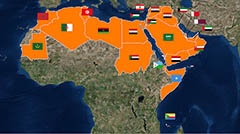The following story by Nadim Khouri, Deputy Executive Secretary at the United Nations Economic and Social Commission for Western Asia (UN ESCWA), was originally published on the Arab Spatial Food Security Blog.
Subsidiarity is the principle that allocates decision-making responsibilities to the individuals or entities that are primarily affected by these decisions. Decisions are only “bumped up” to the larger community level, territorial level, national level, regional, or even global level, if they cannot be dealt with at the lower level of aggregation…why is this important for food security in the Arab Region? Because priority issues of food insecurity can only be addressed through a regional approach.
Even before the Arab uprisings and revolutions, there were regional voices openly calling for the Arab Countries to realize that the externalities of country-specific conflicts and food insecurity aggregated to form problems that could not be adequately dealt with at the country-level. These voices were also suggesting that addressing issues of food insecurity by regional initiatives may have, as indirect impacts, the reduction of tensions and crises that cause conflicts.
Now, the unprecedented levels of violence and suffering, again call for interventions at the regional level. The millions of displaced, refugees, occupied and persecuted people in the Region represent an absolute priority for emergency food security intervention. There are apparent signs of “fatigue” at the global level with respect to assisting with local and national level interventions (as of September 2014, only 40% of the required USD1.5billion had been collected to come to the help of Syrian Refugees). A further invitation for regional efforts to fill the gap—will the region respond? One lesson from almost all crises is that it is never too early to address the underlying causes of the emergencies—as long as this does not detract from dealing with the emergency interventions on the ground. Again, even before the recent revolutions, Africa and the Arab Region were the two regions where only limited—if any—progress was being made on the hunger and malnutrition fronts (the MDG-1, or first Millennium Development Goal). True long-term progress on improving the four components of food security (availability, access, utilization and stability) has interventions that can only happen at a regional level. This includes region-wide collaboration in the areas of facilitation of trade in agricultural products through tariff and non-tariff interventions, the facilitation of FDI’s from within the Region into sustainable agriculture production and processing of food products, research and knowledge exchange into what works in water-saving food production – as well as – in the evaluation of the impact of subsidies applied by the countries of the region. On a broader level, there needs to be a concerted effort to scale up, not just the complementarities in economic potential across countries in the region, but also its social and cultural complementarities as well. It is only through these intimately integrated interventions that the Region can achieve the required top down as well as bottom up commitment to achieving economic, social and cultural integration.
The priorities for countries of the Region are clear: (i) intensify the emergency interventions on the ground through the agencies (most of them UN/global) that are presently providing direct assistance on food security on the ground; (ii) support the League of Arab States and other regional agencies in devising an effective and nimble mechanism for emergency interventions; and (iii) quickly revise existing regional food security and other development plans and identify (perhaps prioritize?) the ones that are truly regional in nature as they are the ones that have most suffered historically. Whatever the technical word for Subsidiarity is—its manifestation is quickly recognizable: solidarity among countries that all have something to gain collectively.







